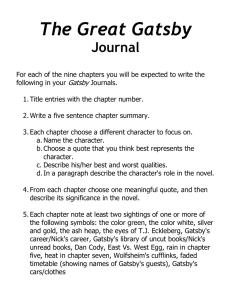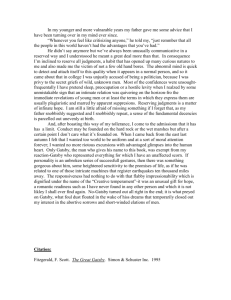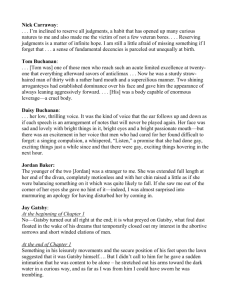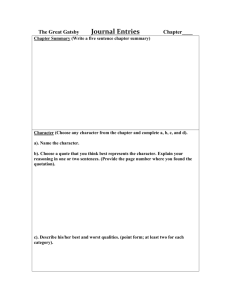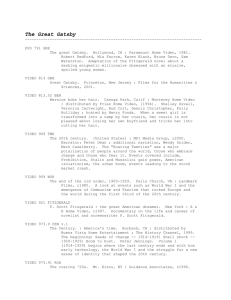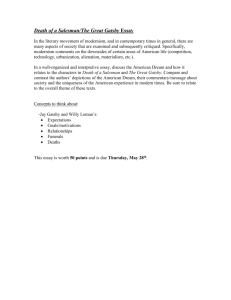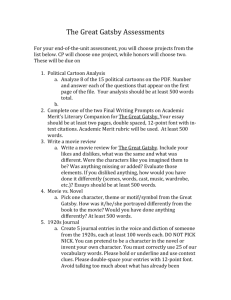Explore the significance of Micro Characters in `The Great Gatsby`
advertisement
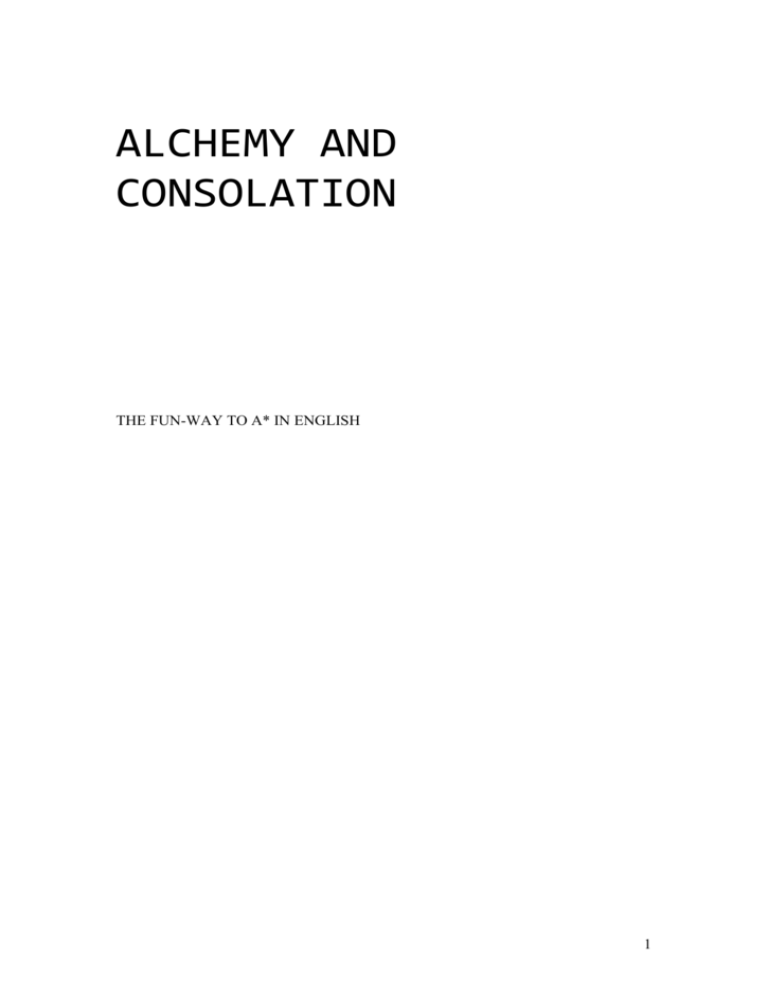
ALCHEMY AND CONSOLATION THE FUN-WAY TO A* IN ENGLISH 1 WELCOME. I HOPE YOU LIKE THE BOOKLET: Below, either do a first draft of a poem about an A* student you knew or draw and label your perfect A* student. In pairs if you like. 2 MY POEMS (i) Hannah Poor young twitchy thing You haven’t really read All of Jane Austen have you? Why did your mother beat you with her Dickens-stick? And send you wandering off in the cold righteous fog To breakfast with Fanny and her fireless grate? How lucky you are with your head start. (ii) Martin Urbanity urbanity urbanity All is urban – Yes we get the idea; very droll, sir. I have brought my cup of tea with me. There will be No challenge, as tea is flavoured water, just like Jonty’s got – and where is the sustainability in that? No I don’t need to write anything down. I’m young. I remember. I talk in italics. (iii) Catherine Scratch, scratch, scratch. Is that the moggy? No but it is The watching, waiting, silent pouncer pouncing On herself, sort of. Then the alchemy occurs at night. Scratch scratch scritch behind the bedroom door. A lonely life - she became a translator and organiser For the Cats’ Protection League. 3 Really we are talking about turning A grade students into A* students. o What factors are negative influences on students making the leap? 4 o How far do any of these matter? Class size? Gender? Who the teacher is and ‘departmental deployment’? Teacher-student relationships? Coursework? How you use questions? Assessment Objectives? Approaches to poetry? Feedback? Action Research? Ask the students who did get A*? What worked for them? (see Page 5) Have we missed any essential areas? 5 6 What students who got A* say about it: Anna: As far as the A*s go, I think the way we were familiarized with the Assessment Objectives really helped. The advice making it clear what each really meant (e.g. on form and structure in each genre) was invaluable. With the poetry, it really helped to just read them when relaxing as well as going through them for homework - I remember Mr X telling us to 'bathe' in The Whitsun Weddings whenever we could, soaking in them, to get to know them. I can still remember some of them all the way through so that definitely helped! I really think the only reason I did so well in my WW1 coursework was due to Mr X very kindly putting in so much time to talk about it Write out mechanically all the poems. This was a suggestion you made because just reading a poem, you miss so much of the craft. You’d be surprised how much more you notice by slowing down the reading. Johnny: I'll be damned if I know - I seem to recall believing that getting more than AAB was going to be just short of impossible. You had to convince me that a retake was worth it! I suppose there might be a serious point in there about cajoling a little genuine selfworth out of surly teenagers who are over-used to being told that they're clever... Charlie Best thing I can remember doing, for English as well as Theatre Studies, was condensing any practice essays we did in class into very short (and therefore memorable) plans i.e. main point, supporting quotes, analysis/effect. As brief as poss. but is something that's easy to remember which can be fleshed out in the exam. Other than that I recited Lear, Larkin and Abse to myself while walking anywhere and can still recall whole poems so it must have worked! Merry: A*s - oh blimey I have no idea! I made sure that for the final exam I knew the texts as well as I could - I had important quotes from King Lear stuck chronologically to my bedroom wall. That 7 meant I roughly knew the whole play in quote form. And I did the same with Blake, and also with critics/context for both. With King Lear especially the more I knew it the more I loved it. Ok bullet points: Quotes / context / critics notes stuck around bedroom and then learning them Thorough knowledge / understanding of the text meant I felt more confident answering any question on it Coursework - I preferred choosing a weird title that I could explore independently I think, it made the process of writing more enjoyable and exciting and I guess that's why I got a better mark? Small essay plans for key themes Watching film adaptations of King Lear A genuine interest in what we were studying! Basically, although I hate exams, I can remember not feeling too bad about the Lear / Blake one, because I honestly thought I knew the texts well, and I liked them (certainly King Lear anyway)! 8 STRATEGIC ISSUES Anything to add – any comments? o Stable department with truly shared goals, sense of pride, self-belief, expertise, familiarity with specification who talk and plan collaboratively, highly professional and dedicated. o Distribute teaching to the best teachers doing the things they know best o Key departmental goal o Limit students’ choices in coursework – differentiate and discuss o Get to know your exam board – work for them and with them o From the start familiarise students with the Assessment Objectives and what they really mean o Choose manageable texts o Know exactly what the data means in terms of what the students need to get for their (A*) target o Early identification 9 Anything new or interesting here? PEDAGOGICAL ISSUES A The relationship between student and teacher is the vital element B They must know the texts or we’ll get nowhere C o Effective feedback to and from student - Marking is challenging and asks questions - always room for improvement especially with A candidates o Challenge in feedback, targets, but most of all questioning (open) o Teachers questioning and improving their own practice by observation and shared observation o Monitor yourself – are you talking too much again? o Insist on protocols for behaviour and classroom practice (but be careful not to damage A) o Targeted help for the underachiever o Getting students to work with other students ‘teaching’ and ‘presenting’ o Practice is exploratory rather than expository or explanatory o Each week there is a ‘YOU ask the questions’ 15 minutes o Ask them about you - what could you do to help them more? o Read for fun, not for notes – what do notes mean? I have learnt tons about film in the past few years – what notes have I made? However… o Independent Learning Journal o Clear goals for lesson/series of lessons… 10 o …yet let lessons range widely as well – you can always bring them back if the trail goes cold o English is thinking and thinking about what you are feeling, make them think and feel, nothing else: let university ruin their enjoyment of literature… o They’re only young – go easy on the smart-alec stuff – stop showing off o Use real essays or Google Docs not just looking on Internet - discourage it in fact o “You just made an A* point” / “That’s an A* passage” (keep and use as examples) 11 D Some things with no basis in researched fact which I suppose are to do with that student-teacher relationship o Make Lessons fun o Academic party tricks o Think Drama – Build A team o No Po-faces don’t get precious like the x department – yes Shakespeare can be boring – it’s for an exam, stoopid o What about your poetry (yes you did once write one!) - your achievements – your story – make it relevant without having an ego trip o o o o Bonding Trips to Theatre etc Start a lunchtime club for broader diet Appoint mentors sympathy for the young – it’s tough today – country in decline; world in flux; no more heroes; all these educated people; how do they cope? o You teach them about irony o Learning Journals, not notes A critical friend comments: Looks very interesting. I think you have covered all the key points. I wish I was going to hear it! Maybe ‘big up’ the idea of making them feel capable of getting an A*, and showing them examples of A* material. An A* shouldn’t be like the Northern Lights – glimpsed by just a few, and seen as a fantastical enigma. It’s just about doing what the examiners want, but having to work hard to get there. Shall we build a community of practice? Shall we have further meetings? Shall we be outward-facing? Shall we intervisitate? If so, contact: rbush@colytongrammar.devon.sch.uk 12 APPENDIX 1: opening up There could be any number of appendices and perhaps we should all write one and make a book. One of the faults of some ‘grade A’ students is their desire to write too much and specifically too much in the first paragraph. The best ones think and refine and end up with pithy, clear openings which address the question and point the way in a fluent unmechanical fashion. You could use this selection with a class. How would students improve these? Do they exhibit A* characteristics from the start? How many assessment objectives have already been touched on? Is Gatsby a Tragedy? “But it was all going too fast now for [Gatsby’s] blurred eyes and he knew that he had lost that part of it, the freshest and the best, forever” – Nick Carraway The word ‘tragedy’ has been corrupted in recent years. In common usage, it has come to mean simply ‘a play with an unhappy ending’, or, even more loosely, ‘an event causing great distress’ or Manchester United lost in a cup final. It is easy, therefore, to offer a simplistic response to this question: that the “holocaust” of The Great Gatsby’s upsetting and violent conclusion makes it a tragic novel. However, there are certain features and functions integral to a formal tragedy – features which, generally, the novel and the character Jay Gatsby fulfil. Fiesta, however, does not – and it is interesting to examine how the spectre of tragedy hangs over a novel haunted by death but containing very little of it. How important is the theme of class in “The Great Gatsby.” Illuminate your reading with “A Room With A View.” Class plays an absolutely vital part in the novel. The colourful range of characters and complexity of plot are created by F.Scott Fitzgerald to reflect this theme. Yet it seems ironic that The Great Gatsby, set in this supposedly modern period of the 1920’s “American Dream” is characterised by class even more so than A Room with a View, set in Edwardian Britain and written twenty years earlier. Do you agree that Gatsby is fascinating? Illuminate your reading by comparing him to Cohn, in Hemingway’s Fiesta. Of course Gatsby is fascinating. From the outset, we are desperate to learn more about this supposedly “great” man, whose dedication to Daisy Buchanan Fitzgerald presents as all-consuming. Gatsby seeks fulfilment and the status he longs for in Daisy, but in the end he dies, his dreams unfulfilled - “just a man named Gatsby”. However, Gatsby is more than “just a man”. He has become the embodiment of ‘The Jazz Age’ - a symbol of affluence and prosperity. Robert Cohn, is not fascinating or in 13 any way “great”. He is a frustrating and tiresome character, with whom it is hard to sympathise. Totally dedicated to Brett and head over heels in love with her, Cohn longs to believe that she will return his love, and that he will gain the acceptance he craves, which, though we have a very different reaction to it, is not dissimilar to Gatsby’s attitude to Daisy. Some people claim that The Great Gatsby is one of the greatest romantic novels of the 20th Century. How far do you agree that Fitzgerald presents Gatsby himself as a ‘great romantic’? Illuminate your answer using Heathcliff from Wuthering Heights by Emily Brontë for comparison. When I first contemplated this question, I decided Gatsby is not a great romantic. I thought he is irrational and naïve to believe that his dream could be achieved, and – as Heathcliff does in Wuthering Heights – to pursue one girl for his whole life. However, after discovering the true definition of a romantic, I realise that Fitzgerald definitely presents him as this, although this definition does not correspond exactly with what some might understand as a ‘great’ romantic. “In F Scott Fitzgerald’s The Great Gatsby, the attitudes to race are, by modern standards, particularly offensive.” Assess this statement and illuminate your answer with a comparison to Ernest Hemmingway’s Fiesta. Despite race not being a key theme in The Great Gatsby, I feel it is a prominent underlying issue in Fitzgerald’s novel. Although the remarks, at times, seem to be offensive, particularly in relation to modern standards, most of the comments on race are being used by Fitzgerald for other reasons than spite or hatred, including pity. In Hemingway’s Fiesta, the racial insults are probably greater and more numerous, but they seem somehow less offensive due to the context of the novel and the characterization. Explore the significance of Micro Characters in ‘The Great Gatsby’ by F. Scott Fitzgerald and ‘A Month in the Country’ by J. L. Carr Although it’s obvious that main characters are the most important in a novel, those individuals mentioned just once or twice are of some significance to an in depth understanding of The Great Gatsby and A Month in the Country. Because they have a smaller role than minor characters, I shall refer to them as ‘micro’ characters, and I intend to explore their effects on the main characters and how they help to enrich the world of the novel Explore the significance of meals and parties in ‘The Great Gatsby’ and ‘Great Expectations’ In The Great Gatsby, meals and parties function to develop character and relationships, in a setting which presents the extravagance of America in the Jazz Age. These parties often end in violence or disorder. In contrast, meals in Great Expectations are used to emphasise the importance of characters’ friendships in rural England in the early Nineteenth Century. 14
